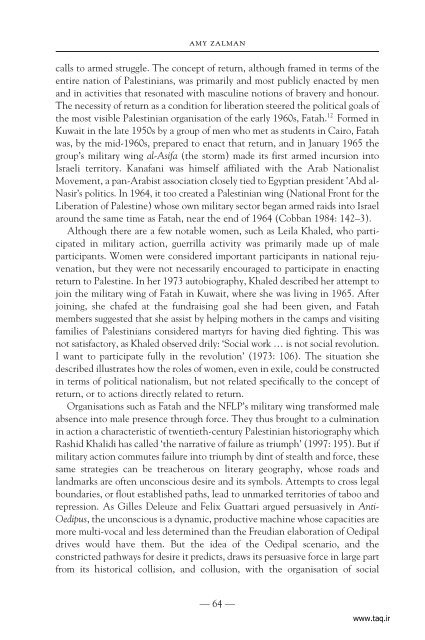LITERATURE AND NATION IN THE MIDDLE EAST
LITERATURE AND NATION IN THE MIDDLE EAST
LITERATURE AND NATION IN THE MIDDLE EAST
- No tags were found...
You also want an ePaper? Increase the reach of your titles
YUMPU automatically turns print PDFs into web optimized ePapers that Google loves.
amy zalmancalls to armed struggle. The concept of return, although framed in terms of theentire nation of Palestinians, was primarily and most publicly enacted by menand in activities that resonated with masculine notions of bravery and honour.The necessity of return as a condition for liberation steered the political goals ofthe most visible Palestinian organisation of the early 1960s, Fatah. 12 Formed inKuwait in the late 1950s by a group of men who met as students in Cairo, Fatahwas, by the mid-1960s, prepared to enact that return, and in January 1965 thegroup’s military wing al-Asifa (the storm) made its first armed incursion intoIsraeli territory. Kanafani was himself affiliated with the Arab NationalistMovement, a pan-Arabist association closely tied to Egyptian president ÆAbd al-Nasir’s politics. In 1964, it too created a Palestinian wing (National Front for theLiberation of Palestine) whose own military sector began armed raids into Israelaround the same time as Fatah, near the end of 1964 (Cobban 1984: 142–3).Although there are a few notable women, such as Leila Khaled, who participatedin military action, guerrilla activity was primarily made up of maleparticipants. Women were considered important participants in national rejuvenation,but they were not necessarily encouraged to participate in enactingreturn to Palestine. In her 1973 autobiography, Khaled described her attempt tojoin the military wing of Fatah in Kuwait, where she was living in 1965. Afterjoining, she chafed at the fundraising goal she had been given, and Fatahmembers suggested that she assist by helping mothers in the camps and visitingfamilies of Palestinians considered martyrs for having died fighting. This wasnot satisfactory, as Khaled observed drily: ‘Social work … is not social revolution.I want to participate fully in the revolution’ (1973: 106). The situation shedescribed illustrates how the roles of women, even in exile, could be constructedin terms of political nationalism, but not related specifically to the concept ofreturn, or to actions directly related to return.Organisations such as Fatah and the NFLP’s military wing transformed maleabsence into male presence through force. They thus brought to a culminationin action a characteristic of twentieth-century Palestinian historiography whichRashid Khalidi has called ‘the narrative of failure as triumph’ (1997: 195). But ifmilitary action commutes failure into triumph by dint of stealth and force, thesesame strategies can be treacherous on literary geography, whose roads andlandmarks are often unconscious desire and its symbols. Attempts to cross legalboundaries, or flout established paths, lead to unmarked territories of taboo andrepression. As Gilles Deleuze and Felix Guattari argued persuasively in Anti-Oedipus, the unconscious is a dynamic, productive machine whose capacities aremore multi-vocal and less determined than the Freudian elaboration of Oedipaldrives would have them. But the idea of the Oedipal scenario, and theconstricted pathways for desire it predicts, draws its persuasive force in large partfrom its historical collision, and collusion, with the organisation of social— 64 —www.taq.ir






